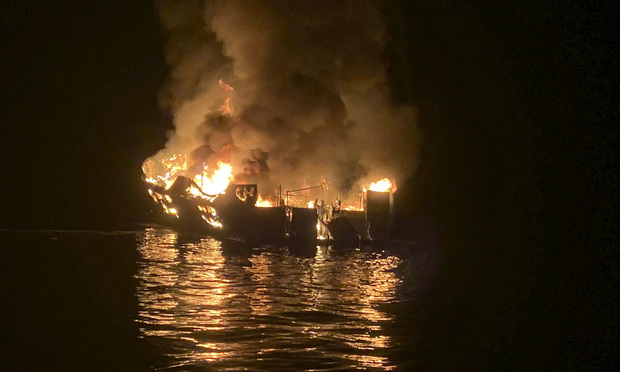Boat Owners Seek to Head Off Lawsuits After 34 Die in Fire
Truth Aquatics, which owned the Conception, filed an action under a pre-Civil War provision of maritime law that allows it to limit its liability, a time-tested legal maneuver that has been successfully employed by owners of the Titanic and countless other crafts.
September 06, 2019 at 11:54 AM
6 minute read
 A dive boat is engulfed in flames after a deadly fire broke out aboard the commercial scuba diving vessel off the Southern California Coast. (Santa Barbara County Fire Department via AP, File)
A dive boat is engulfed in flames after a deadly fire broke out aboard the commercial scuba diving vessel off the Southern California Coast. (Santa Barbara County Fire Department via AP, File)
The owners of the dive boat where 34 people perished in a fire off Southern California filed a lawsuit to head off potentially costly litigation, a move condemned by some observers as disrespectful to the families of the dead.
Truth Aquatics Inc., which owned the Conception, filed the action in U.S. District Court in Los Angeles under a pre-Civil War provision of maritime law that allows it to limit its liability.
Investigators are still searching for what caused the blaze that wrecked the boat, which remains upside down at the bottom of the sea near the Channel Islands.
The time-tested legal maneuver has been successfully employed by owners of the Titanic and countless other crafts — some as small as Jet Skis — and was widely anticipated by maritime law experts. Still, the fact it was filed just three days after the deadly inferno Monday came as a surprise to legal observers.
Families of the deceased, who are not named in the complaint, will be served with notice that they have a limited time to challenge the company's effort to clear itself of negligence or limit its liability to the value of the remains of the boat, which is a total loss.
"They're forcing these people to bring their claims and bring them now," said attorney Charles Naylor, who represents victims in maritime law cases. "They have six months to do this. They could let these people bury their kids. This is shocking."
Professor Martin J. Davies, the maritime law director at Tulane University, said the cases always follow accidents at sea and always look bad, but they are usually initiated by insurance companies to limit losses.
"It seems like a pretty heartless thing to do, but that's what always happens. They're just protecting their position," Davies said. "It produces very unpleasant results in dramatic cases like this one. … The optics are awful."
The U.S. law dates to 1851, but it has its origins in 18th century England, Davies said. It was designed to encourage the shipping business. Every country with a shipping industry has something similar on the books.
In order to prevail, the company and owners Glen and Dana Fritzler have to show they were not at fault in the disaster.
They asserted in the lawsuit that they "used reasonable care to make the Conception seaworthy, and she was, at all relevant times, tight, staunch, and strong, fully and properly manned, equipped and supplied and in all respects seaworthy and fit for the service in which she was engaged."
Even if the captain or crew are found at fault, the Fritzler's and their insurance company could avoid paying a dime under the law, experts said.
All of those who died were in a bunkroom below the main deck. Officials have said the 33 passengers and one crewmember had no ability to escape the flames.
Crew members told investigators they made several attempts to rescue the people who were trapped before abandoning ship, the National Transportation Safety Board said. None of the survivors has spoken publicly.
The court filing not only seeks to protect the boat owners from legal exposure, but also will require any lawsuits to be filed in the same federal court.
A judge will hold a non-jury trial to see if the company can successfully show it wasn't at fault. If that's the case, any claimants would only be entitled to the value of the remains of the ship, which the suit said is a total loss with zero value.
There's a long history of ship owners successfully asserting this protection. The case involving the White Star Line, the owners of the Titanic, went all the way to the U.S. Supreme Court, which held that a foreign owner could assert protection of the Limitation Act, attorney James Mercante said.
In that case, plaintiffs eventually withdrew their lawsuits and filed them in England, where the company was based. British law, even though it also limited damages, provided a bigger payout than the value of the remaining lifeboats.
While the law can shield owners from damages, over 90% of cases where injury and death are involved are settled before trial, Mercante said.
Attorney A. Barry Cappello, who is in discussions with another firm to represent family members of the Conception victims in court, said there's a strong case to show negligence in the boat fire and that good lawyers can find a way around the admiralty law in federal court.
"The law is so antiquated and so skewed in favor of the ship owners that damages for wrongful death type cases is very limited unless one can prove exceptions," Cappello said.
Cappello recently prevailed in a case in which a company that rented a paddleboard to a man who drowned in Santa Barbara Harbor had asserted the liability protection. A judge ruled the admiralty law didn't extend to such crafts, though the company has appealed.
Davies said from what he's heard of the disaster, there's a realistic prospect the owner might prevail if the boat was properly equipped and the cause of the fire remains mysterious.
If the owner loses, there's the potential of unlimited liability.
"That's why the fight is always about limitation because if you've got unlimited liability, well, … 30 dead people is a whole lot of money," Davies said.
Brian Melley reports for the Associated Press.
This content has been archived. It is available through our partners, LexisNexis® and Bloomberg Law.
To view this content, please continue to their sites.
Not a Lexis Subscriber?
Subscribe Now
Not a Bloomberg Law Subscriber?
Subscribe Now
NOT FOR REPRINT
© 2025 ALM Global, LLC, All Rights Reserved. Request academic re-use from www.copyright.com. All other uses, submit a request to [email protected]. For more information visit Asset & Logo Licensing.
You Might Like
View All


U.S. Eleventh Circuit Remands Helms-Burton Trafficking Case Involving Confiscated Cuban Port
3 minute read
Miami Lawyer Guilty of Indirect Criminal Contempt But Dodges Paying Legal Fees
4 minute readTrending Stories
- 111th Circuit Rejects Trump's Emergency Request as DOJ Prepares to Release Special Counsel's Final Report
- 2Supreme Court Takes Up Challenge to ACA Task Force
- 3'Tragedy of Unspeakable Proportions:' Could Edison, DWP, Face Lawsuits Over LA Wildfires?
- 4Meta Pulls Plug on DEI Programs
- 5On the Move and After Hours: Meyner and Landis; Cooper Levenson; Ogletree Deakins; Saiber
Who Got The Work
Michael G. Bongiorno, Andrew Scott Dulberg and Elizabeth E. Driscoll from Wilmer Cutler Pickering Hale and Dorr have stepped in to represent Symbotic Inc., an A.I.-enabled technology platform that focuses on increasing supply chain efficiency, and other defendants in a pending shareholder derivative lawsuit. The case, filed Oct. 2 in Massachusetts District Court by the Brown Law Firm on behalf of Stephen Austen, accuses certain officers and directors of misleading investors in regard to Symbotic's potential for margin growth by failing to disclose that the company was not equipped to timely deploy its systems or manage expenses through project delays. The case, assigned to U.S. District Judge Nathaniel M. Gorton, is 1:24-cv-12522, Austen v. Cohen et al.
Who Got The Work
Edmund Polubinski and Marie Killmond of Davis Polk & Wardwell have entered appearances for data platform software development company MongoDB and other defendants in a pending shareholder derivative lawsuit. The action, filed Oct. 7 in New York Southern District Court by the Brown Law Firm, accuses the company's directors and/or officers of falsely expressing confidence in the company’s restructuring of its sales incentive plan and downplaying the severity of decreases in its upfront commitments. The case is 1:24-cv-07594, Roy v. Ittycheria et al.
Who Got The Work
Amy O. Bruchs and Kurt F. Ellison of Michael Best & Friedrich have entered appearances for Epic Systems Corp. in a pending employment discrimination lawsuit. The suit was filed Sept. 7 in Wisconsin Western District Court by Levine Eisberner LLC and Siri & Glimstad on behalf of a project manager who claims that he was wrongfully terminated after applying for a religious exemption to the defendant's COVID-19 vaccine mandate. The case, assigned to U.S. Magistrate Judge Anita Marie Boor, is 3:24-cv-00630, Secker, Nathan v. Epic Systems Corporation.
Who Got The Work
David X. Sullivan, Thomas J. Finn and Gregory A. Hall from McCarter & English have entered appearances for Sunrun Installation Services in a pending civil rights lawsuit. The complaint was filed Sept. 4 in Connecticut District Court by attorney Robert M. Berke on behalf of former employee George Edward Steins, who was arrested and charged with employing an unregistered home improvement salesperson. The complaint alleges that had Sunrun informed the Connecticut Department of Consumer Protection that the plaintiff's employment had ended in 2017 and that he no longer held Sunrun's home improvement contractor license, he would not have been hit with charges, which were dismissed in May 2024. The case, assigned to U.S. District Judge Jeffrey A. Meyer, is 3:24-cv-01423, Steins v. Sunrun, Inc. et al.
Who Got The Work
Greenberg Traurig shareholder Joshua L. Raskin has entered an appearance for boohoo.com UK Ltd. in a pending patent infringement lawsuit. The suit, filed Sept. 3 in Texas Eastern District Court by Rozier Hardt McDonough on behalf of Alto Dynamics, asserts five patents related to an online shopping platform. The case, assigned to U.S. District Judge Rodney Gilstrap, is 2:24-cv-00719, Alto Dynamics, LLC v. boohoo.com UK Limited.
Featured Firms
Law Offices of Gary Martin Hays & Associates, P.C.
(470) 294-1674
Law Offices of Mark E. Salomone
(857) 444-6468
Smith & Hassler
(713) 739-1250






